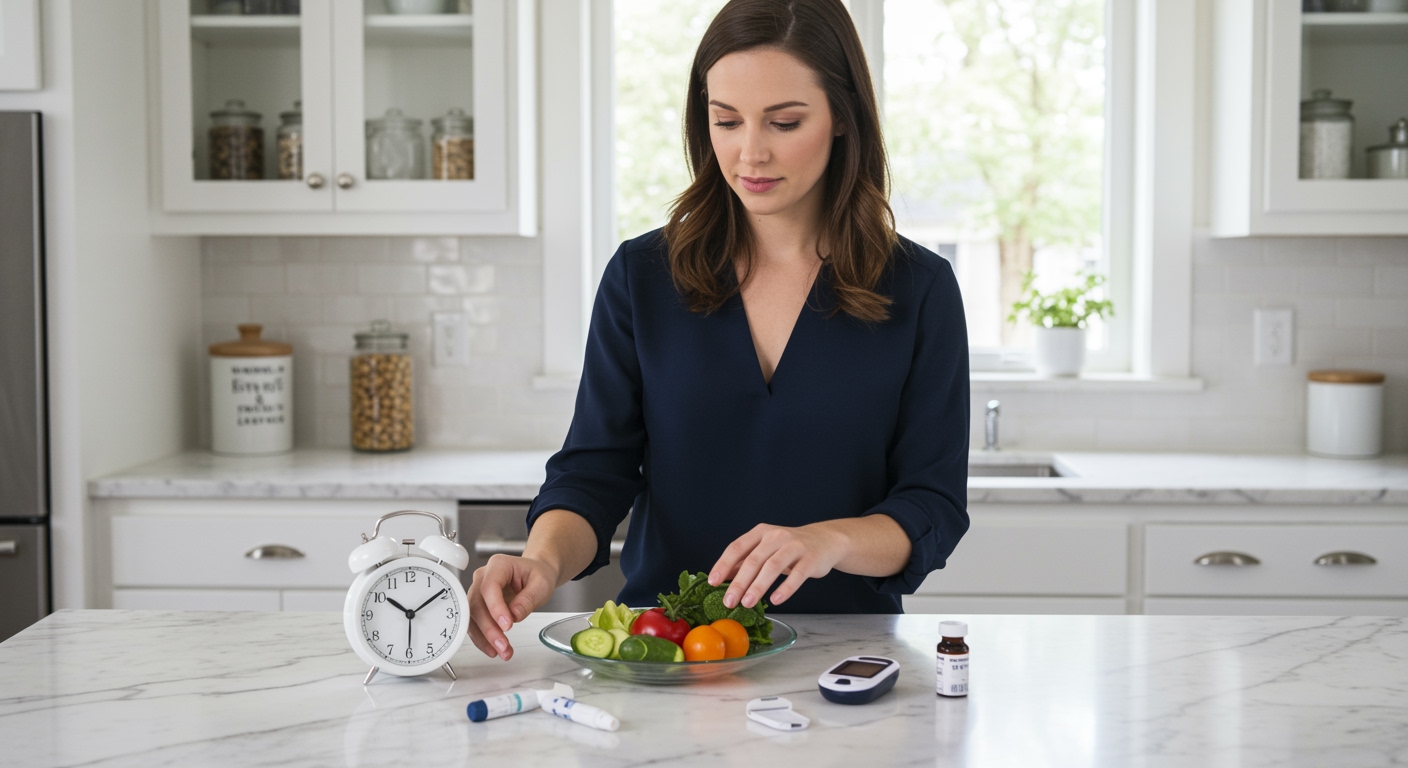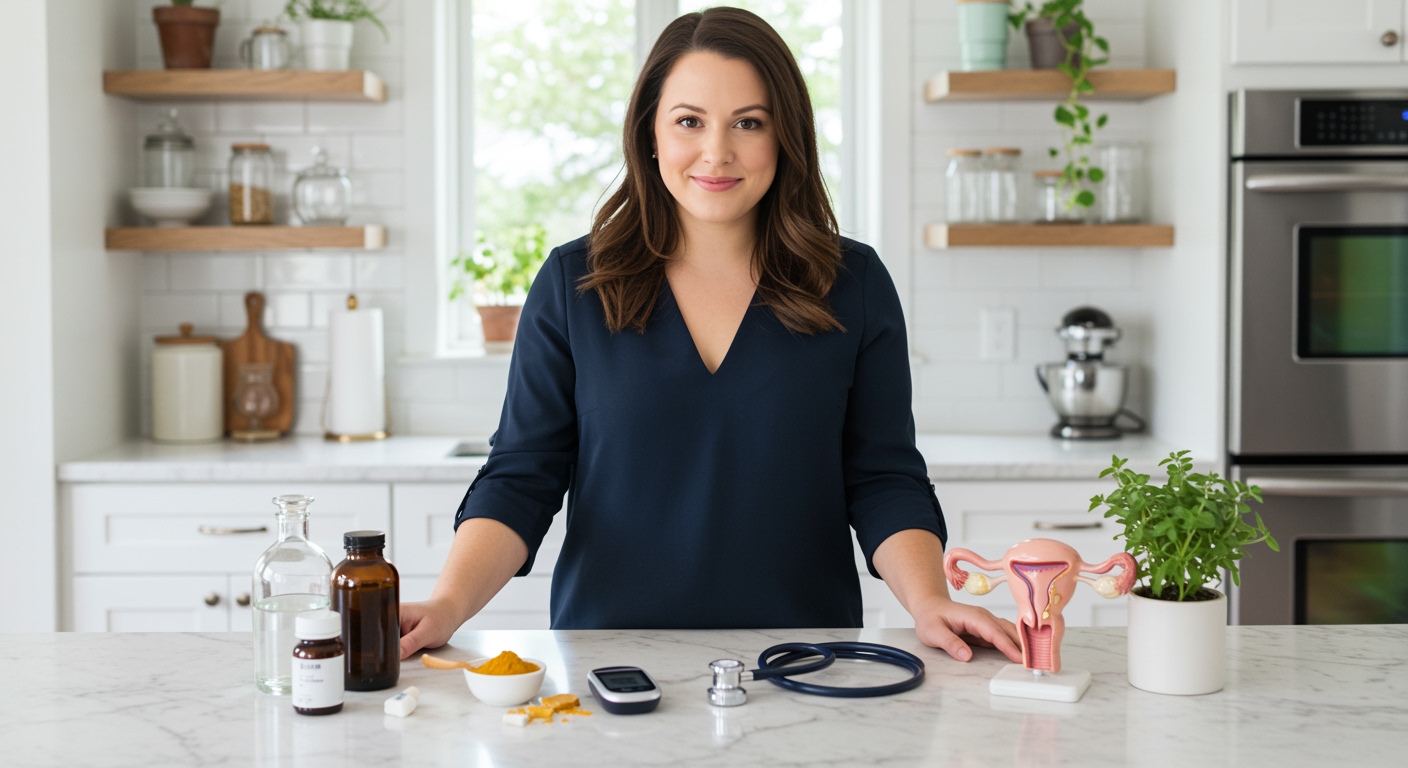✪ Key Takeaway: Meal timing significantly impacts PCOS insulin resistance by regulating blood sugar spikes and hormone fluctuations throughout the day.
Introduction
You eat the same foods but your blood sugar still goes crazy.
You might wonder if when you eat matters more than what you eat for managing PCOS insulin resistance.
Hi, I am Abdur, your nutrition coach and today I am going to explain how meal timing affects your insulin sensitivity and whether it can help control PCOS symptoms.
How Does Meal Timing Affect Your Insulin Response?
Your body follows a natural circadian rhythm that controls when hormones are released.
Insulin sensitivity changes throughout the day, with your body being most sensitive to insulin in the morning hours.
Research shows that eating the same meal at different times produces different blood sugar responses.
A study found that people had 20% higher blood sugar spikes when they ate identical meals at night compared to morning.
This happens because your pancreas produces less insulin and your muscles become more insulin resistant as the day progresses.
For women with PCOS, this natural decline in insulin sensitivity becomes even more pronounced due to existing hormonal imbalances.
✪ Fact: Your insulin sensitivity can be up to 50% lower in the evening compared to morning hours.
What Happens When You Skip Breakfast With PCOS?
Skipping breakfast might seem like a good way to reduce overall calorie intake.
However, this strategy often backfires for women with PCOS because it disrupts your natural hormone patterns.
When you skip breakfast, your cortisol levels remain elevated longer, which increases insulin resistance throughout the day.
Studies show that women with PCOS who skip breakfast have higher testosterone levels and worse insulin sensitivity compared to those who eat regular morning meals.
Your body also produces more ghrelin (hunger hormone) when you skip breakfast, leading to intense cravings later.
These cravings often result in overeating high-carb foods during lunch or dinner when your insulin sensitivity is already naturally lower.
Research indicates that eating a protein-rich breakfast within 2 hours of waking helps stabilize blood sugar and reduce afternoon insulin spikes.
✪ Pro Tip: Aim for 20-25 grams of protein at breakfast to maximize insulin sensitivity benefits.
Should You Eat Large Dinners If You Have PCOS?
Many people eat their largest meal at dinner because of work schedules and social habits.
Unfortunately, this timing pattern works against your body’s natural insulin rhythm.
Evening meals cause higher and longer-lasting blood sugar spikes because your insulin sensitivity decreases by 20-50% after sunset.
A landmark study with PCOS patients found that women who ate larger breakfasts and smaller dinners lost more weight and had better insulin markers.
The breakfast group also showed significant improvements in testosterone levels and ovulation rates.
Late dinners also disrupt your sleep quality, which further worsens insulin resistance the next day.
Ideally, you should finish your last meal at least 3 hours before bedtime to allow proper digestion and hormone regulation.
✪ Note: Eating 70% of your daily calories before 2 PM can improve PCOS symptoms significantly.
Does Intermittent Fasting Help PCOS Insulin Resistance?
Intermittent fasting has gained popularity as a tool for improving insulin sensitivity.
Some studies suggest that time-restricted eating can help women with PCOS lose weight and improve metabolic markers.
However, the timing of your eating window matters more than the fasting duration itself.
Early time-restricted eating (eating between 8 AM and 4 PM) shows better results than late eating windows for PCOS management.
This approach aligns your food intake with your natural circadian rhythm when insulin sensitivity is highest.
Women who practice early intermittent fasting report better energy levels, reduced cravings, and improved menstrual regularity.
However, intermittent fasting is not suitable for everyone with PCOS, especially those with a history of eating disorders or extreme stress.
✪ Pro Tip: Start with a 12-hour eating window before attempting longer fasting periods with PCOS.
What Is The Best Meal Timing Strategy For PCOS?
The most effective meal timing strategy for PCOS involves eating your largest meal at breakfast.
Aim to consume 40-50% of your daily calories before noon when insulin sensitivity is at its peak.
Your lunch should be moderate in size, providing about 30-35% of your total daily calorie intake.
Dinner should be the smallest meal, accounting for only 15-25% of your daily calories and eaten at least 3 hours before bedtime.
Include protein at every meal to help stabilize blood sugar and reduce insulin spikes throughout the day.
Space your meals 4-5 hours apart to allow your insulin levels to return to baseline between eating periods.
This timing pattern helps optimize your natural hormone rhythms and can significantly improve PCOS symptoms over time.
✪ Fact: Women following this meal timing pattern show 30% better insulin sensitivity within 12 weeks.
The Bottom Line
Meal timing absolutely matters for PCOS insulin resistance and can be as important as what you eat.
Your body clock is your best friend when fighting insulin resistance – work with it, not against it.
I would love to hear about your experience with meal timing and PCOS management, so please share your thoughts or questions in the comments below.
References
At NutritionCrown, we use quality and credible sources to ensure our content is accurate and trustworthy. Below are the sources referenced in creating this article:
- Science Daily: Large breakfast rich in protein and fat improves glycemic control in type 2 diabetics
- PubMed: High caloric intake at breakfast vs. dinner differentially influences weight loss of overweight and obese women
- PMC: The Role of Breakfast in the Treatment of Obesity
- PMC: Meal Timing and Frequency: Implications for Cardiovascular Disease Prevention





